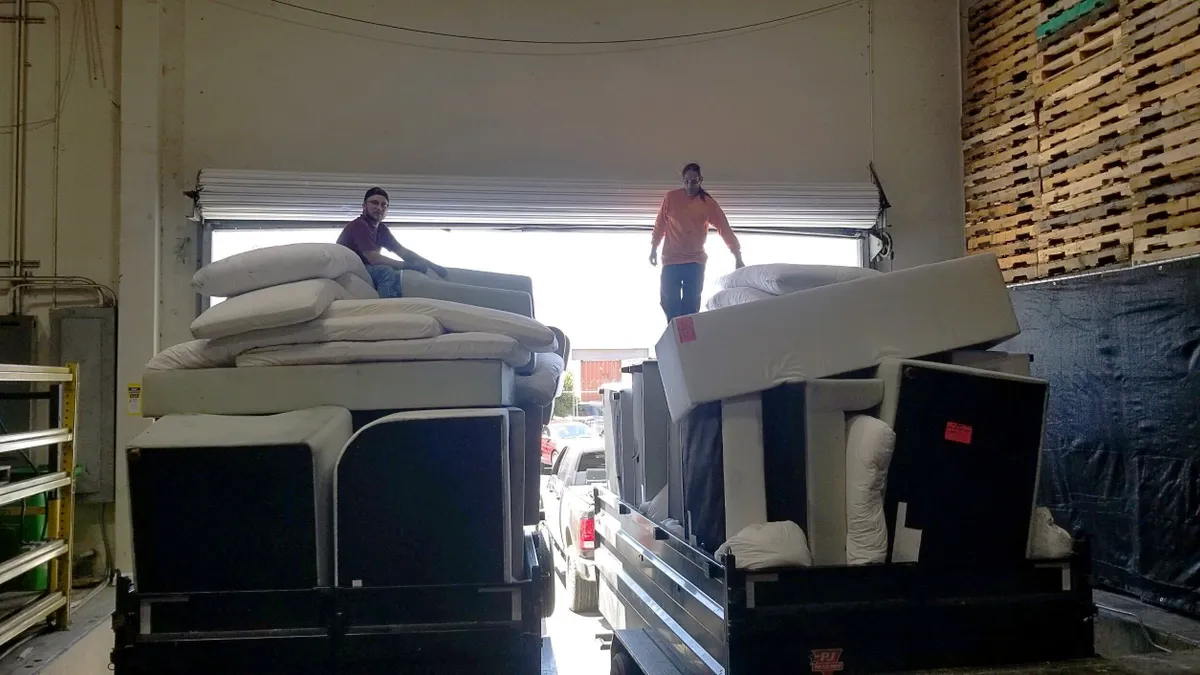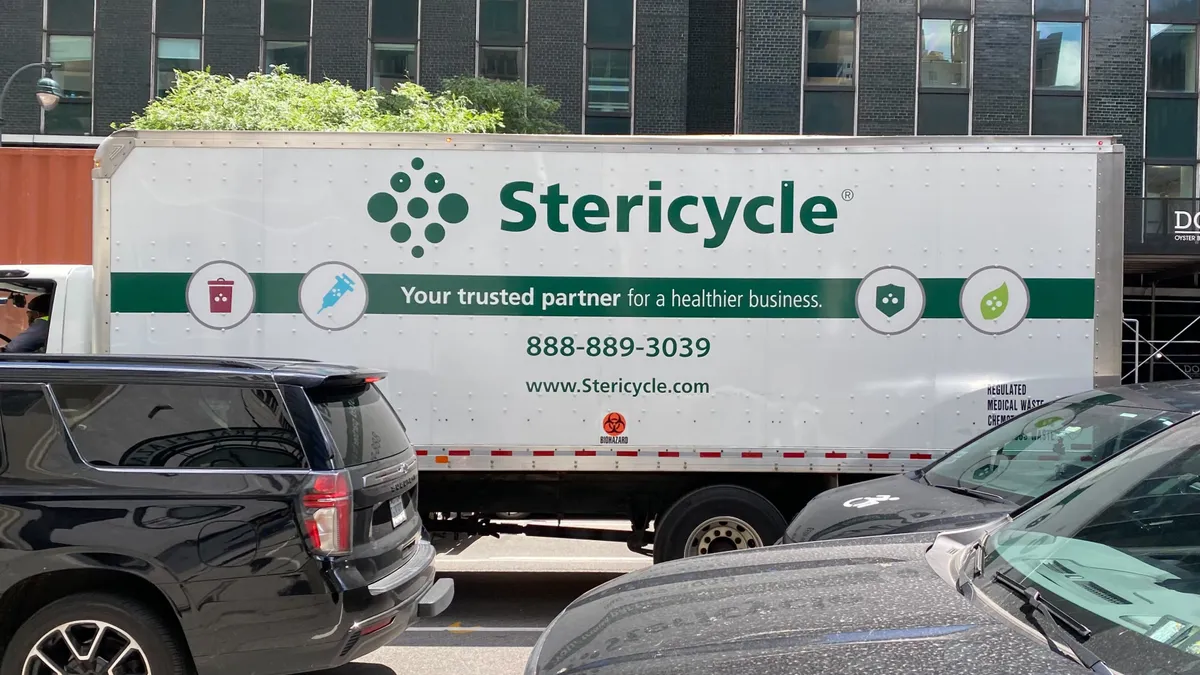As Trash Warrior seeks to grow its customer base across the U.S., its competition isn’t the solid waste industry’s biggest names — it’s the likes of Craigslist, Yelp and TaskRabbit.
Trash Warrior offers a B2B marketplace connecting customers like Amazon and Instacart with local waste removal businesses, and, more recently, final disposal or transformation sites too. The San Francisco-based startup, founded in 2019, shared this month that it raised $8 million earlier this year. The pre-Series A round was led by AltalR Capital.
Founder and CEO Lily Shen said in an interview with Waste Dive this past week that waste has still been a “blue ocean opportunity” for startups; while some investors may not see the innovation opportunities in trash removal, the relatively few competitors make it an attractive industry.
Shen explained that while large companies with warehouses, for instance, may receive routine trash pickups from major haulers, the nature of their work generates extra packaging or product waste on an unpredictable schedule that requires additional removal requests. Trash Warrior aims to provide structure to those ad hoc needs.
The company is now capable of fulfilling service “in every zip code in the United States,” Shen said, and is deepening its market knowledge in its heaviest areas, including on the West Coast and in populous states like New York, Texas and Illinois.
This interview has been edited for clarity and brevity.
WASTE DIVE: Which needs does Trash Warrior serve today?
LILY SHEN: We are now primarily focused on B2B waste management to try to be the one stop shop for B2B customers with frequent waste management needs.

The current solutions we're seeing across the board for Amazon, etc., is that for multi-location businesses that need to use [waste management], usually the solution involves getting into one or a few vendors for each location, and cycling through them with a very high churn rate.
For example, for Amazon warehouses that do fulfillment and delivery for your online Amazon Prime orders — almost all of them that we know of and we have served in, essentially 50% of the waste needs are done ad hoc by posting on Craigslist instead of a more formal channel. So that's a big headache for warehouse managers, a big headache for the providers as well, in terms of how unstable the relationships are. And basically – reliability, accountability, sustainability, transparency – all of these figures that people would care about for waste management, they're not there for those kinds of services. We’re trying to make it happen with no problems.
What are some things you do differently from traditional waste hauling services to serve these types of businesses?
Really the core of the business is a tech-enabled platform where the haulers do the following: one is they claim the tasks from the platform. The tasks on the platform have very detailed specs on what's expected, including where the items need to be dropped off. And they essentially are not able to get paid until the service is done and everything has followed instructions.
So when a service is completed they have to [complete a task flow] where they upload before and after pictures, dumping receipts, dumping amount, the destination of dumping — and everything needs to match up with the instructions in order for them to get paid. The other problem we're seeing with the Craigslist model is there's no accountability on both sides. There's no accountability from the customer, there's no accountability from the provider … There's no penalty [if Amazon canceled], vice versa there's no penalty for [a hauler] to not show up at the door of Amazon on time. Because it's just transactional.
But when you have a platform where there are so many providers counting on the platform to generate a sustainable amount of income for their growing small business, the behavior change is large. So you can implement [a quite detailed set of minimum expectations] of performance of services. Some of that can be centered around sustainability or accountability.
So for example, being late for an hour is a penalty item on our platform. Not communicating beforehand about your ETA is another one. Illegal dumping is essentially an immediate ban … So that solves a lot of problems, because indeed one of the biggest complaints or concerns of both customers and [law enforcement or environmental regulators] of the local governments are illegal dumping from those Craigslist kind of connections.
In terms of sustainability, are there any diversion thresholds that you all try to hit? Or does it just depend on the customer and what they're trying to do?
Some customers will come to us with a very strong sustainability metric that they need to hit … Either because of their fiduciary duty to their board or it might be their marketing strategy to the customers, they need to be able to say that “we are very sustainable.” And then because of that, they're looking for solutions that are guaranteed … So you need to have a waste management partner that's able and willing to go through those customized solutions for you to make it happen.
On the other hand, even for customers that don't care about this, say they only care about price, we offer our services with a very strong sustainability mandate. There's two reasons for that. One is we truly care about the environment. The other reason is actually economical. Usually, if there is a destination that's willing to accept those goods as recyclables, or in the case of biofuel power plants it is actually used as an input — the cost of dumping is much lower and sometimes the receiving end pays you money. So for another business that cares about minimizing waste management costs, going to a solution that's more sustainable is oftentimes cheaper.
In every single city in the U.S., there are many, many different ways of dumping cardboard. So for example, San Francisco [has some 50 facilities that] receive cardboard. What's the difference between them? Their outcome is quite different for that cardboard, as well as the pricing is quite different. And if you're working with a small family business that you found on Craigslist, they don't really know the pricing of all the 50 locations, they probably know two or three that's near to them and they will pick one that they are most familiar with.
But now as a marketplace that has been around for a few years we do know quite well, and are improving our dataset every day, which dumping locations are the best solutions for each of the waste streams … which are the ones that are most economical, which are the ones that offer the most sustainable solutions. And we are rolling out features this year — so Philadelphia is fully rolled out, other cities are following — [where] Trash Warrior now not only picks the provider for the customer, but also picks the final destination. So we're now like a three-way marketplace where we'll connect customers with a truck, and connect a truck to an end destination and a solution for that waste.



















